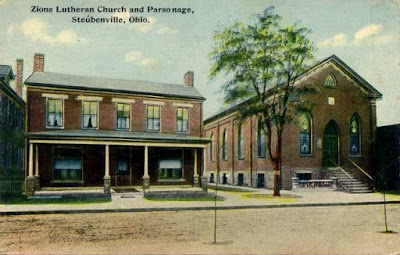Yesterday I read a FamilySearch Blog post, Tracing German American Immigrants by Nathan Murphy, in which he reviewed research by Roger P. Minert concerning the likeliest places to find the hometowns of Germans who immigrated to the U.S. before 1900.
Dr. Minert's research indicates that the most likely place to discover an immigrant's hometown is through local church vital records in the U.S. This means that if you can discover your ancestor's congregation, and if records were kept in that congregation and included the hometown of origin of your German ancestor, and if the records were not destroyed, and if the church has a historian or is kind enough to let you search their records (and you can read and translate old handwritten German script), you may be able to discover your ancestor's city of origin in Germany.
 |
| Zion Lutheran Church and Parsonage, Steubenville, Ohio |
A few years ago I began a search for church records for Henry. Since the church was a Lutheran church I contacted several Lutheran Church organizations, including ELCA (Evangelical Lutheran Church of America). I finally learned that Zion Lutheran Church had no affiliation with other Lutheran churches and in the early 1900s it became Zion United Church of Christ.
At the time of that discovery Zion UCC had a historian who was able to decipher old German handwriting and was willing to search the old journals. I can only imagine what a challenging search it must have been to scour page after page -- 50 years' worth of records -- searching for Henry and his children. She stopped at 1870, the year of Henry's marriage, which did not yet name his home town. He immigrated in 1866 so it's possible that had I asked her to search those four more years his city of origin maybe have been found. (At the time I didn't have the heart to ask her to look through four more years after having searched so many already.)
I hesitate to ask her to search further back in the records for Henry and also search for Sophia and Carl Kropp. I hesitate but now that I know church records are the one best source, I know I'll decide to contact the church again and ask for this help.
Possible places to learn of an ancestor's church affiliation are obituaries, cemetery records, and marriage records. Newspaper articles about church activities and events sometimes also name participants in the activities.
For more information about searching for your German immigrant ancestors and Dr. Minert's work, go read the post.
I may be hoping against hope, but hope I will!
--Nancy.
Copyright © 2009-2016 Nancy Messier. All Rights Reserved.
.

You have given the historian a break, so go ahead and ask. I hope she is still there.
ReplyDeleteI started a letter tonight and will finish it tomorrow. Thanks for the encouragement to ask, Wendy. From what I can see on their website, the lady who translated is now president of the church. I hope she is also still the historian!
Delete